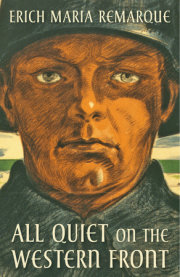Chapter One
clerfayt pulled in at a service station where the snow had been cleared away, and blew the horn. Crows were cawing noisily around the telephone poles, and in the small workshop behind the pumps someone was hammering away at sheet metal. The hammering stopped, and a boy of sixteen emerged. He wore a red sweater and steel-rimmed glasses.
“Fill her up,” Clerfayt said, getting out.
“High-test?”
“Yes. Any place to eat here?”
The boy jerked his thumb toward the other side of the road. “Over there. They were serving Berner Platte for lunch. Want me to take off the chains?”
“Why?”
“The road is even icier farther up.”
“All the way up the pass?”
“You can’t drive over the pass. It’s been closed again since yesterday. Report from the automobile club. With a low sports car like this one, you’d never make it anyhow.”
“Really?” Clerfayt said. “You arouse my curiosity.”
“And you arouse mine,” the boy replied.
The air in the restaurant was stale, smelling of old beer and a long winter. Clerfayt ordered Bündner Fleisch, bread, cheese, and a carafe of Aigle. He had the girl bring his meal out to the terrace. It was not very cold outside. The sky was vast and gentian blue.
“Want me to hose down the buggy?” the boy called across from the service station. “It damn well needs it.”
“Never mind. Just clean the windshield.”
The car had not been washed in a long time, and showed it. A torrential rain beyond Aix had caked the red dust of the Saint-Raphaël coast into a batik pattern on hood and fenders. To that had been added splashed lime from puddles on the roads of central France, and the filth hurled at the chassis by the rear wheels of innumerable trucks. Why have I driven up here at all? Clerfayt thought. It’s too late for skiing anyway. And pity? Pity is a poor companion for a journey—and a still worse destination. Why don’t I drive to Munich? Or to Milan? But what would I do in Munich? Or Milan? Or anywhere else? I am tired, he thought. Tired of staying places and tired of leaving them. Or am I only tired of decisions? But what do I have to decide that amounts to anything? He finished his wine and went back inside the restaurant.
The girl was standing behind the counter, washing glasses. The stuffed head of a chamois stared out of glassy eyes over her head at the advertisement for a Zurich brewery on the opposite wall. Clerfayt took a flat leather bottle from his pocket. “Can you fill this with cognac for me?”
“Courvoisier, Remy Martin, Martell?”
“Martell.”
The girl began measuring out the cognac, glass by glass. A cat came in and rubbed around Clerfayt’s legs. He asked for two packs of cigarettes and matches also, and paid his check.
“Are those kilometers?” the gas-station boy in the red sweater asked, pointing to the speedometer.
“No, miles.”
The boy whistled sharply. “What are you doing up in the Alps? Why don’t you keep a car like this on the autostrada?”
Clerfayt looked at him. Glittering eyeglasses, a turned-up nose, a broken-out skin, prominent ears—a creature that had just exchanged the melancholia of childhood for all the faults of semi-adulthood. “We don’t always do what’s right, son,” he said. “Even if we know what it is. Sometimes the whole charm of life is making the wrong choices. Get it?”
“No,” the boy replied, snuffing. “But you’ll find the SOS telephones all along the pass. If you get stuck, just call. We’ll come and get you. Here’s our number.”
“Don’t you have Saint Bernards any more, with little kegs of brandy on their collars?”
“No. Brandy costs too much these days, and the dogs got wise. They drank the stuff themselves. Nowadays we have oxen for rescue work. Big strong oxen to pull the cars out.”
The boy met Clerfayt’s stare with glittering glasses, and did not flinch.
“You’re just about all I needed today,” Clerfayt said at last. “An Alpine wise guy at four thousand feet! Is your name by any chance Pestalozzi? Or Lavater?”
“No. My name’s Göring.”
“What?”
“Göring.” The boy grinned, revealing a missing incisor. “But my first name is Hubert.”
“Any relation to . . .”
“No,” Hubert cut in. “We’re Basel Görings. If we belonged to the other family, I wouldn’t have to be pumping gas here. We’d be sitting pretty on a fat pension from the German government.”
Clerfayt gave the boy a searching look. “A strange day,” he said finally. “Who would have expected it? Good luck to you in your future undertakings, son. You’ve been a big surprise to me.”
“You’re no surprise to me. You’re a racing driver, aren’t you?”
“What makes you think so?”
Hubert Göring pointed to an almost-vanished number under the dirt on the hood.
“A detective, too!” Clerfayt got into the car. “Maybe it might be better to lock you up soon, to save humanity another calamity. Once you’re premier, it will be too late.”
He started the motor. “You’ve forgotten to pay,” Hubert stated. “Forty-two Fränkli.”
Clerfayt gave him the money. “Fränkli!” he said. “That reassures me, Hubert. A country that has pet names for its money will never become a dictatorship.”
An hour later, the car was stuck fast. Several pieces of snow fence had given way on the slope, and a drift had buried the road. Clerfayt could have turned and driven back down, but he did not care to meet Hubert Göring’s smug look again so soon. Besides, in general he did not like turning back. So he remained patiently sitting in his car, smoking cigarettes, drinking cognac, listening to the racket of the crows, and waiting for God.
God appeared after a while in the shape of a small snowplow. Clerfayt shared the remainder of his cognac with the driver. Then the man drove on ahead, and his machine began whirling up the snow and tossing it aside. It looked as if it were sawing a huge, white, fallen tree into a sparkling circle of chips which, in the slanting sunlight, showed all the colors of the rainbow.
Two hundred yards farther on, the road was clear again. The snowplow pulled over to the side, and Clerfayt’s car glided past it. The driver waved after him. Like Hubert, he was wearing a red sweater and glasses. For that reason, Clerfayt had not ventured any talk with him beyond the safe subjects of snow and liquor; a second Göring so soon after the other would have been a bit too much.
Hubert had been fibbing; the pass was no longer closed. The car mounted rapidly toward the crest, and suddenly, far below, the valley lay outspread before Clerfayt, blue and soft in the early dusk. Scattered over it like toys out of a box were the white roofs of the village, a church spire that seemed to lean, skating rinks, a few hotels, and the first lighted windows of houses. Clerfayt stopped the car for a moment and looked at the view. Then he drove slowly down the serpentine curves. Somewhere down below must be the sanatorium where Hollmann was staying—Hollmann, his co-driver, who had become sick a year ago. The doctor had found it was tuberculosis. Hollmann had laughed at the diagnosis—there was no such disease any more, in this age of antibiotics and miracle molds. And even if there were, the doctors gave you a handful of pills, a few shots, and you were well again. But the wonder drugs had not been quite so wonderful and infallible as they were supposed to be, especially not for people who had grown up during the war and been undernourished for years. During the Mille Miglia in Italy, Hollmann had had a hemorrhage just outside Rome, and Clerfayt had had to drop him off at the depot. The doctor had insisted on sending him to the mountains for a few months. Hollmann had raged, and finally yielded; but by now the few months had become a year.
The motor began to sputter. The plugs, Clerfayt thought. Fouled again. That came from not thinking about what you were doing while you drove. He let the car roll down the last part of the slope till it stopped on the level, and opened the hood.
They were, as always, the plugs of the second and fourth cylinders. He unscrewed them, cleaned them, put them back, and started the car again. The motor ran normally, and he pumped the accelerator a few times by hand to rid the cylinders of the superfluous oil. As he straightened up to close the hood, he caught a glimpse of a sleigh and saw the horses shy at the whine of the motor and start to swerve across the road toward the car, the sleigh leaping behind them. He ran toward them, seized the left horse by the bridle, and pulled back for all he was worth.
He was dragged for a few steps. Then the animals stopped. They were quivering, and the steam of their breath was eddying around their heads. Their wild, frightened eyes seemed to belong to primeval creatures. Clerfayt cautiously let go of the leather straps. The horses stood still, snorting and shaking their bells. He could see that they were no ordinary sleigh horses.
A tall man wearing a cap of black fur stood up in the sleigh and spoke reassuringly to the team. He acted as if Clerfayt were not there. Beside him, gripping the arms of her seat hard, sat a young woman. She had a tanned face and very bright eyes.
“I’m sorry to have startled you,” Clerfayt said. “It didn’t occur to me that horses up here might not be used to cars.”
The man occupied himself with the animals a minute longer. Then he let the reins fall slack and turned half around. “Not to cars that make such a racket,” he replied in an unfriendly tone. “Still, I would have been able to hold the sleigh. Thank you, though, for wanting to save us.”
Clerfayt looked up quickly. The face above him was haughty, with a trace of mockery somewhere in it, as though the man were politely ridiculing him for trying unnecessarily to play the hero. It was a long time since he had so intensely disliked anyone at first sight.
“I did not want to save you,” he replied dryly. “Just to save my car from being run into.”
“I hope you haven’t been too badly splattered for your pains.”
The man concerned himself with the horses again. Clerfayt looked at the woman in the sleigh. So that’s why, he thought. Wants to be the hero himself. “No, I haven’t been splattered,” he replied slowly.
The Bella Vista Sanatorium stood on a small height above the village. Clerfayt parked the car in a level square, where a few sleighs stood. He switched off the motor and put a blanket over the hood to keep it warm. “Clerfayt!” someone called from the entrance.
He turned, and was astonished to see Hollmann running toward him. He had expected him to be in bed.
“Clerfayt!” Hollmann called. “Is it really you?”
“As real as I’m ever likely to be. And you! You’re up and about? I thought you’d be lying in bed.”
Hollmann laughed. “That’s old-fashioned.” He slapped Clerfayt on the back. His eyes devoured the car. “I thought I heard Giuseppe’s roar, but figured it must be some kind of hallucination. Then I saw you coming up the rise. What a surprise! Where are you coming from?”
“From Monte Carlo.”
“What do you know!” Hollmann was in a state of high excitement. “And with Giuseppe, the old lion! I was beginning to think you two had forgotten me.”
He patted the chassis of the car. He had driven it with Clerfayt in half a dozen races, and had been in it when he had his first bad hemorrhage. “It’s still Giuseppe, isn’t it? Not a younger brother already?”
“It’s Giuseppe. But he’s not running any more races. I bought him from the factory. He’s in retirement now.”
“Just like me.”
“You’re not in retirement; you’re on leave.”
“A whole year! That’s not a leave any more. But come on in. We have to celebrate your coming. What do you drink these days? Still vodka?”
Clerfayt laughed. “Don’t tell me you have vodka up here?”
“For visitors, we have everything. This is a modern sanatorium.”
“It would seem so. It looks like a hotel.”
“That’s part of the treatment. Modern therapy. We’re guests taking a cure, not patients any longer. The words ‘sickness’ and ‘death’ are taboo. They’re ignored. Applied psychology. Marvelous for morale, but people die just the same. What were you doing in Monte Carlo? Did you ride in the rally?”
“I did. Don’t you read the sports news any more?”
Hollmann gave an embarrassed laugh. “At the beginning, I used to. Then I stopped. Idiotic, isn’t it?”
“No, sensible. Read it when you’re driving again.”
“Right,” Hollmann said. “When I’m driving again. And when I win the grand prize in the sweepstakes. Who was your co-driver in the rally?”
“Torriani.”
They walked toward the entrance. The snowy slopes glowed pink in the setting sun. Skiers shot like black commas through the glitter. “Pretty up here,” Clerfayt said.
“Yes, a pretty prison.”
Clerfayt did not reply. He knew other prisons.
“Are you teamed up with Torriani regularly these days?” Hollmann asked.
“No. I keep changing co-drivers. I’m waiting for you.”
That was not true. For the past six months, Clerfayt had been driving all the sports-car races with Torriani. But since Hollmann no longer read the sports news, it was a handy lie.
It affected Hollmann like wine. A light dew of perspiration formed on his forehead. “Did you win anything in the rally?” he asked.
“Not a thing. We were too late.”
“Where did you drive from?”
“Vienna. It was a crazy idea. We were stopped by every Soviet patrol. They seemed to think we might be kidnaping Stalin. Mostly, I wanted to try out Giuseppe’s successor. What roads they have in the Soviet Zone! Like leftovers from the Ice Age!”
Hollmann laughed. “That was Giuseppe’s revenge. Where did you start before that?”
Clerfayt raised his hand. “Let’s have a drink. And do me a favor—for the first few days let’s talk about anything you like, only not about races and cars.”
“But Clerfayt—what else should we talk about?”
“Just for a few days.”
“What’s the matter? Has something happened?”
“Nothing. I’m just tired out. I want to rest a bit and for a few days forget about this crazy business of putting people into machines that go too fast and having them drive like mad. Can’t you understand that?”
“Sure I can,” Hollmann said. “But what’s wrong? What’s happened?”
“Nothing,” Clerfayt replied impatiently. “I’m just superstitious, like the rest of us. My contract is running out and hasn’t been renewed. I don’t want to jinx anything, that’s all.”
“Clerfayt,” Hollmann said, “who has cracked up?”
“Ferrer. In a silly, stinking little race on the coast.”
Copyright © 1998 by Erich Maria Remarque. All rights reserved. No part of this excerpt may be reproduced or reprinted without permission in writing from the publisher.
















